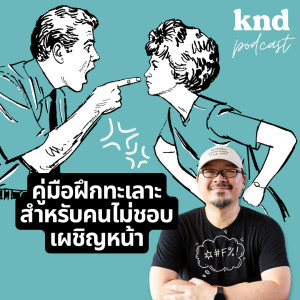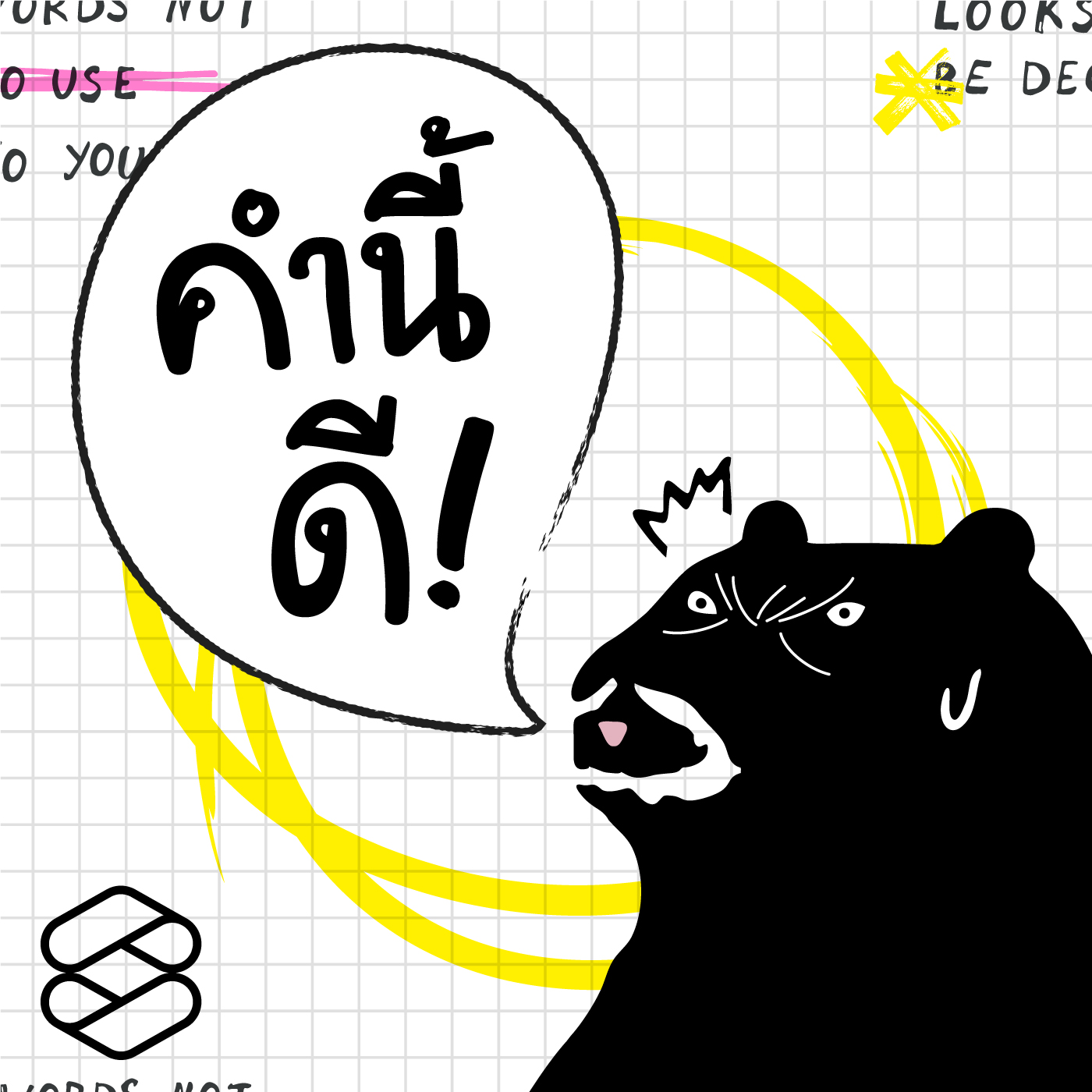Episodes

Monday Apr 04, 2022
KND876 ทำไมเราต้องรู้จักเถียงกันให้มากขึ้น | Don’t Agree To Disagree
Monday Apr 04, 2022
Monday Apr 04, 2022
การเถียงกันไม่ใช่เรื่องแย่หรือการไม่เคารพอีกฝ่ายเสมอไป เพราะการพยายามพูดคุย ถกเถียง คือสัญญาณบอกว่าเรา ‘ให้คุณค่า’ และ ‘แคร์’ กับความเห็นของเขามากพอที่จะมาเสียเวลาถกเถียงหาทางออกโดยไม่ปล่อยผ่าน… มากู้หน้าแก้ชื่อเสียงให้กับ ‘การเถียง’ แล้วเลิก ‘Agree to Disagree’ กันเถอะ!
📌 THE PLIGHT OF THE PEOPLE PLEASER
I’ve been determined to keep the peace. Whatever the cause, in psychology there’s a name for my affliction. It’s called agreeableness, and it’s one of the major personality traits around the world. Agreeable people tend to be nice. Friendly. Polite.
My first impulse is to avoid even the most trivial of conflicts.
When students fill out course evaluations, one of their most common complaints is that I’m “too supportive of stupid comments.”
Disagreeable people tend to be more critical, skeptical, and challenging. They’re not just comfortable with conflict; it energizes them.
📌 If you’re highly disagreeable, you might be happier in an argument than in a friendly conversation.
That quality often comes with a bad rap: disagreeable people get stereotyped as curmudgeons who complain about every idea, or Dementors who suck the joy out of every meeting.
In 2000, Pixar was on fire. (Toy Story 1&2, A Bug’s Life) Yet the company’s founders weren’t content to rest on their laurels.
They recruited an outside director named Brad Bird to shake things up. (The Incredibles 1&2, Ratatouille,
Brad had just released his debut film, which was well reviewed but flopped at the box office, so he was itching to do something big and bold.
When he pitched his vision, the technical leadership at Pixar said it was impossible: they would need a decade and $500 million to make it.
Brad (Bird) wasn’t ready to give up. He sought out the biggest misfits at Pixar for his project—people who were disagreeable, disgruntled, and dissatisfied. Some called them black sheep. Others called them pirates.
When Brad rounded them up, he warned them that no one believed they could pull off the project.
Notice what Brad didn’t do.
He didn’t stock his team with agreeable people.
Rethinking depends on a different kind of network: a challenge network, a group of people we trust to point out our blind spots and help us overcome our weaknesses.
Their role is to activate rethinking cycles by pushing us to be humble about our expertise, doubt our knowledge, and be curious about new perspectives.
They give the critical feedback we might not want to hear, but need to hear.
I’ve watched too many leaders shield themselves from task conflict. As they gain power, they tune out boat-rockers and listen to bootlickers.
I’m looking for disagreeable people who are givers, not takers. Disagreeable givers often make the best critics: their intent is to elevate the work, not feed their own egos. They don’t criticize because they’re insecure; they challenge because they care. They dish out tough love.
📌 DON’T AGREE TO DISAGREE
If you watch Brad argue with his colleagues—you can quickly see that the tension is intellectual, not emotional. The tone is vigorous and feisty rather than combative or aggressive.
It’s possible to disagree without being disagreeable.
“In fact, when I argue with someone, it’s not a display of disrespect—it’s a sign of respect. It means I value their views enough to contest them. If their opinions didn’t matter to me, I wouldn’t bother.” – (Adam Grant)
📌 Avoiding conflicts improves nothing and gets you nowhere
📌 แลดูขาดความสามัคคี แต่นี่คือสิ่งที่เราต้องการ
📌 เราต้องหัดถกเถียงท้าทายกันให้เป็น และให้มากขึ้น
📌 เป้าหมายเลิศเลอที่เราหมายตาไว้ ‘ถ้าไม่เถียง ก็ไม่ถึง’
📌 เราต้องรู้จักคุ้นชินกับ friction การกระทบกระทั่งเป็นเรื่องธรรมดาในการทำงาน และมันไม่เท่ากับการ offense
📌 “Disagreeable people also make agreeable people comfortable arguing, too.”
📌 ฝากไว้สำหรับคน non-confrontational (พวกเดียวกับผม)
Source: Think Again: The Power of Knowing What You Don't Know by Adam Grant
ฉบับแปลไทยชื่อ Think Again คิดแล้ว, คิดอีก
ผู้แปล: วิโรจน์ ภัทรทีปกร
สำนักพิมพ์: WE LEARN
จำนวนหน้า: 408 หน้า ปกอ่อน
พิมพ์ครั้งที่ 1 — มีนาคม 2565
ราคาปก 395 บาท
📌 สรุปศัพท์
Plight (n.) สถานการณ์หรือสภาพแย่ๆ an unpleasant condition
Keep the peace ไม่หาเรื่อง, อยู่อย่างสันติ
Affliction (n) โรค something that makes you suffer
Agreeableness (n) ความเป็นคนโอนอ่อนผ่อนตาม, เออออกับทุกคน the quality of being friendly and pleasant
Agreeable (adj) เห็นด้วยกับทุกอย่าง, เข้าได้กับทุกคน able to be accepted by everyone
A bad rap (reputation) มีภาพลักษณ์ไม่ค่อยดี
Curmudgeon (n) คนแก่ขี้บ่น
Rest on one's laurels เหลิงในความสำเร็จ
Shake (things) up ปรับเปลี่ยน
Well reviewed but flopped at the box office : รีวิวอย่างดีแต่กำไรไม่มีสักบาท
Itching to do something bid and bold : รู้สึกคันอยากทำอะไรบ้าๆ ใหญ่ๆ
Misfit (n) พวกเข้ากับคนอื่นไม่ได้ (ไม่ฟิตอิน), นอกคอก, นอกแถว, แปลกแยก
Disagreeable, disgruntled, and dissatisfied : ไม่น่าคบ, ขี้โมโห, ไม่เคยพอใจกับอะไรสักอย่าง
Round them up : เรียกมาล้อมวงได้ (เกณฑ์คนมาได้)
Pull off : เริ่ม
Vigorous หนักแน่นจริงจัง
Feisty (adj) ขันแข็ง, มุ่งมั่ง active, forceful, and full of determination
Combative หาเรื่อง
Aggressive ก้าวร้าว
Friction การกระทบกระทั่ง, แรงเสียดทาน
Non-confrontational คนไม่ชอบเผชิญหน้า, ไม่ชอบมีปัญหาหรือต้องบวกกับคนอื่น
Tune out boat-rockers and listen to bootlickers : ผลักไสพวกขยันเขย่าเรือไปสนใจพวกขยันเลีย
Avoiding conflicts improves nothing and gets you nowhere การเลี่ยงความขัดแย้งไม่ช่วยอะไรแถมยังทำให้คุณย่ำอยู่กับที่
It’s possible to disagree without being disagreeable. การไม่เห็นด้วยแบบที่คนอื่นเอาเราด้วยนั้นเป็นไปได้
6509 + 24 = 6533 🥳


Comments (0)
To leave or reply to comments, please download free Podbean or
No Comments
To leave or reply to comments,
please download free Podbean App.